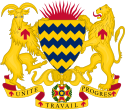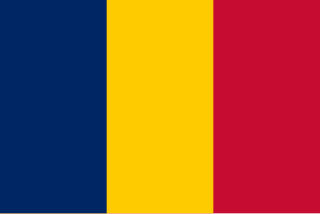Chad, officially the Republic of Chad, is a landlocked country in West Africa. It borders Libya to the north, Sudan to the east, the Central African Republic to the south, Cameroon and Nigeria to the southwest, and Niger to the west. Due to its distance from the sea and its largely desert climate, the country is sometimes referred to as the "Dead Heart of Africa".

The Timorese Democratic Union is a conservative political party in East Timor. It was the first party to be established in the country on May 11, 1974, following the Carnation Revolution in Portugal.

Chad was a part of the French colonial empire from 1900 to 1960. Colonial rule under the French began in 1900 when the Military Territory of Chad was established. From 1905, Chad was linked to the federation of French colonial possessions in Middle Africa, known from 1910 under the name of French Equatorial Africa. Chad passed in 1920 to French civilian administration, but suffered from chronic neglect.

Gabriel Francisco Lisette was a Chadian politician who played a key role in the decolonization of Chad.

Pierre Toura Gaba (1920–1998) was a Chadian politician and diplomat. Following the independence of Chad, he served as its first Minister of Foreign Affairs from 1960 to 1961.

Parliamentary and municipal elections in Mauritania occurred on 19 November and 3 December 2006. At least 28 political parties competed to comprise the lower house of parliament, the National Assembly; Islamist parties were banned, but many Islamists ran as independent candidates. 95 seats in the National Assembly were at stake in the election, along with over 200 local councils.

Parliamentary elections were held in Chad on Sunday, 13 February 2011, the first since 2002. The elections were originally scheduled for 28 November 2010, but were postponed following a meeting in September between the ruling party and opposition leaders. According to the National Independent Electoral Commission (CENI), this was due to timing constraints caused by complications encountered during electoral preparations.

The Union for the New Republic, was a French political party founded on 1 October 1958 that supported Prime Minister Charles de Gaulle in the 1958 elections.

The Independent Socialist Party of Chad, initially called Independent Social Party of Chad, was a political party in Chad.

The Independent Socialist Party of Chad was a political party in Chad.
Elections to the French National Assembly were held in Chad and Ubangi-Shari on 2 January 1956. The territories elected four seats to the Assembly via two electoral colleges; the first college spanned both territories and elected one seat, whilst Chad elected two seats via the second college and Ubangi-Shari one. René Malbrant was re-elected from the first college and Barthélémy Boganda from the second college in Ubangi-Shari. In the second college in Chad the Chadian Union and Chadian Social Action won one seat each, taken by Gabriel Lisette and Arabi el Goni respectively.

General Council elections were held in Chad on 15 December 1946, with a second round of voting on 12 January 1947.
El-Hadj Abbo Nassour Abdoulaye Sabre was a Chadian politician. Born in a Northern family, he served in several ministerial functions before being jailed 1963. He was later released and returned to the political limelight 1969–1975.










